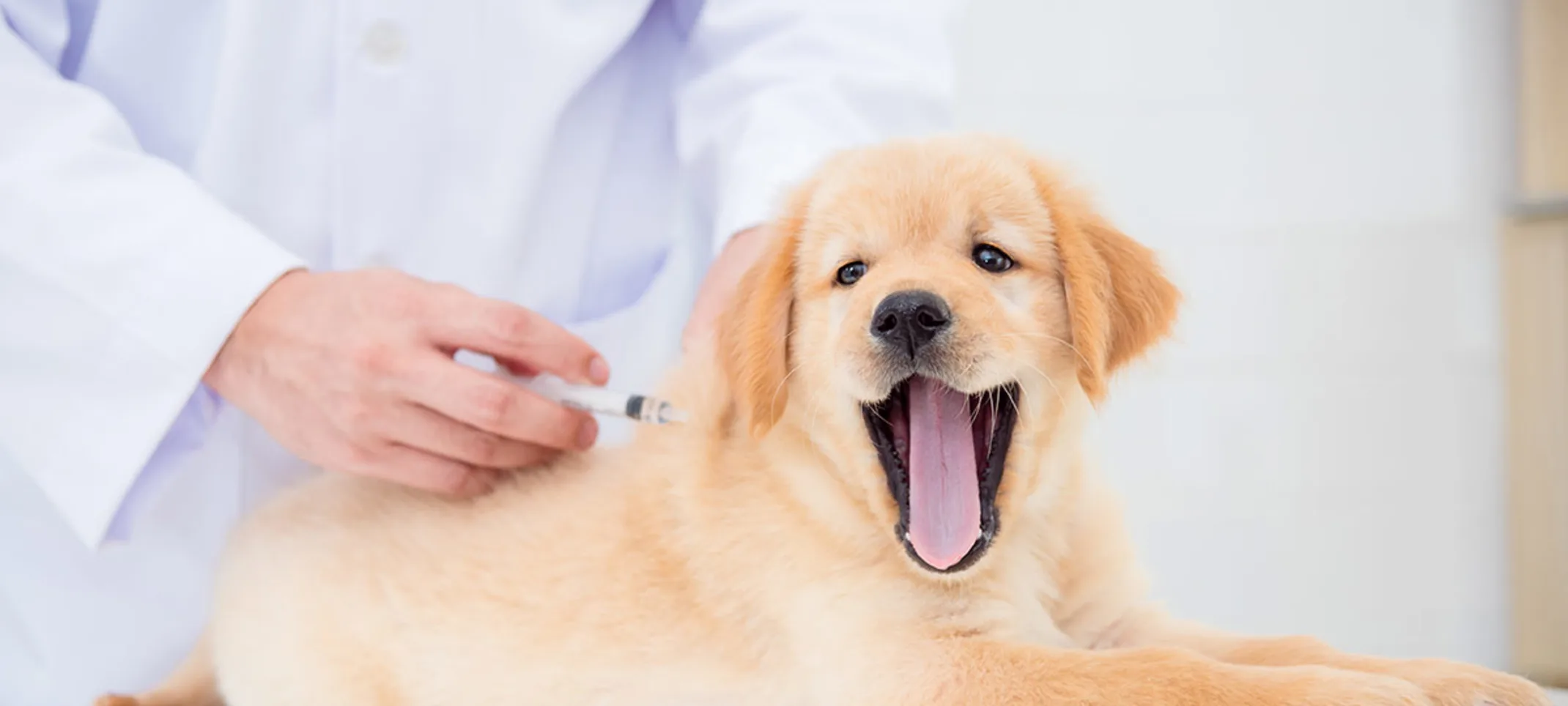Brookswood Animal Clinic
Vaccinations
Preventative care is an important aspect in maintaining your pet’s health. Proper vaccination is vital in protecting them against harmful diseases.

Overview
We believe that preventative care is one of the most important aspects of maintaining your pet’s health. There are a variety of diseases that affect animals, so proper vaccination of your pet is vital in protecting them from the many types of illnesses to which they are susceptible to.
Why are vaccinations important?
Vaccinations are vital to the health and protection of your pet, and serve as a preventive measure in combating viral diseases like Parvovirus, Parainfluenza virus, Distemper, Lyme Disease, Panleukopenia, Feline Leukemia Virus, and Rabies.
When should my pet get vaccinated?
Vaccinations are particularly important for puppies, kittens, and other young animals that have immature immune systems. Veterinary vaccinations generally begin at 6-8 weeks of age and then boostered throughout your pet’s life depending on the vaccine. Our doctors will determine the appropriate vaccination plan for your pet.
How are vaccines administered?
Vaccines help to combat diseases by exposing the pet's immune system to inactive or small amounts of a particular form of bacteria or virus. Vaccines are administered through a subcutaneous injection (under the skin), orally, or intra-nasally, depending on the vaccine.
Vaccinations are accompanied by a consultation and examination with our veterinarians to make certain that your pet's condition is stable enough to receive them. Proper and timely administration is necessary to ensure optimal protection.
Vaccinations at Brookswood
At Brookswood, we believe that vaccination protocols should be tailored to each individual pet, depending on exposure and risk factors. The AAHA lifestyle-based vaccine calculator is a fantastic resource that helps determine what vaccines should be considered for your pet. You can find the website here: AAHA vaccine calculator. We also offer blood antibody testing for those pets for whom vaccination is not safe or recommended.
Please ask us if you'd like to know more about what is recommended for your pet.
Rabies Vaccine
This vaccine is recommended for all dogs and cats, regardless of lifestyle or age. The disease is zoonotic (can be transferred to humans) and has a nearly 100% mortality rate. Furthermore, it is required by law. Exemptions may be given in cases of previous severe vaccine reaction. Clients frequently ask why the rabies vaccine is required for indoor-only pets. The answer is that bats can and do get into the home, hitching rides in laundry or entering through open windows! This vaccine has a very low incidence of side effects.
Distemper/Parvovirus/Adenovirus Vaccine
This vaccine is recommended for all dogs, regardless of lifestyle or age. Although neither distemper nor adenovirus are common in the northwest, as rescue groups transfer more animals from the southern US as well as other countries, we are likely to see increased incidence of these diseases in the coming years. Parvovirus is common in our environment here in the Northwest. This virus causes severe gastrointestinal distress and, without treatment, can cause death. Parvovirus can live up to 1 year in grassy, shady environments, and can be shed within the coyote population. We strongly recommend vaccinating any puppy for this virus, at least twice before the age of 16 weeks. (The ideal schedule is 8 weeks, 12 weeks, and 16 weeks to provide proper immunity). This vaccine has a very low incidence of side effects.
Bordetella
This oral vaccine for dogs is preventative against "kennel cough" otherwise known as canine infectious respiratory disease complex (CIRDC). Much like the human influenza vaccine, the Bordetella vaccine is not 100% protective against kennel cough, as there are multiple "bugs" that can cause this disease complex. However, it does protect against the most common one. Most boarding facilities and doggie daycares require this vaccine. This vaccine has a very low incidence of side effects, although it can sometimes cause a very mild and self-limiting cough.
Influenza
This virus is still rare in our area but has gained traction in the Midwest and southern California. Recently, the Oregon Humane Society had a group of transferred dogs test positive. Like most flu viruses, this one causes a more significant respiratory illness than kennel cough, usually resulting in a fever and sometimes resulting in pneumonia. The severity of the disease varies, with some dogs just exhibiting a mild cough. Some boarding facilities are requiring this vaccine. We recommend it if your dog has significant interactions with other dogs, goes to boarding facilities, or if you or a family member volunteer at an animal shelter. You can read more about canine influenza in Oregon here.
Leptospirosis
This is another emerging infectious disease in Oregon. It is spread through urine contamination by wildlife, and picked up by dogs in standing water. This disease is also zoonotic and can cause illness in humans. The negative to this vaccine is that it only protects against the most common serovars (strains), and therefore your dog can still get Leptospirosis if they are exposed to a different serovar. We recommend this vaccine in dogs that have a lot of exposure to wildlife and standing water. Examples would be hunting dogs, hiking dogs, or dogs that are frequent swimmers. This vaccine does have a higher rate of local reactions than the other vaccines; it is not uncommon for dogs to be sore at the injection site for a day or two.
Rattlesnake
This vaccine is the least "proven" of all the vaccines listed. The vaccine company promotes that it decreases the severity of the reaction to the rattlesnake bite, decreasing the time the dog needs to spend in the hospital. In studies, this has not been supported. This vaccine does not eliminate the need to seek medical care if your dog is bitten by a snake. You can find more information here: Rattlesnake vaccine
Feline Leukemia
Feline leukemia is a virus that is spread by "affiliative" contact between cats (friendly contact). This means sharing the same food bowl, grooming each other, etc. It can also be spread from a positive queen to her kittens. Vaccination for Feline Leukemia as a kitten likely provides significant ongoing protection against the virus, although boosting is recommended every three years. We recommend vaccinating every kitten or newly acquired adult cat for this disease. That said, if you then decide to keep your cat indoors only, he/she may not need any boosters. Please go here for more information. This vaccine typically causes minimal post-vaccination reactions or discomfort.
Feline Viral Rhinotracheitis, Calicivirus, and Panleukopenia (FVRCP)
This vaccine, like the DAP vaccine in dogs, provides protection against a multitude of disease processes. The most important one is panleukopenia or "feline distemper" (read more here) which is very similar to parvovirus in dogs (resulting in severe gastrointestinal distress and often death). The other two diseases that this vaccine protects against are components of upper respiratory infection in cats (read more here). We recommend that all kittens/cats receive an initial series of this vaccine. Cats with exposure to other cats (indoor-outdoor, boarding facilities, etc) should receive this vaccine every three years. This vaccine typically causes minimal post-vaccination reactions or discomfort.
Feline Rabies
Every cat should receive a rabies vaccine on a regular schedule. We carry both the 1 year and the 3 year rabies vaccines for cats. The 3 year is more expensive than the 1 year, and they exhibit similar efficacy. We only use the purevax rabies vaccines in cats to avoid the risk of vaccine-induced fibrosarcomas. This vaccine typically causes minimal post-vaccination reactions or discomfort.
